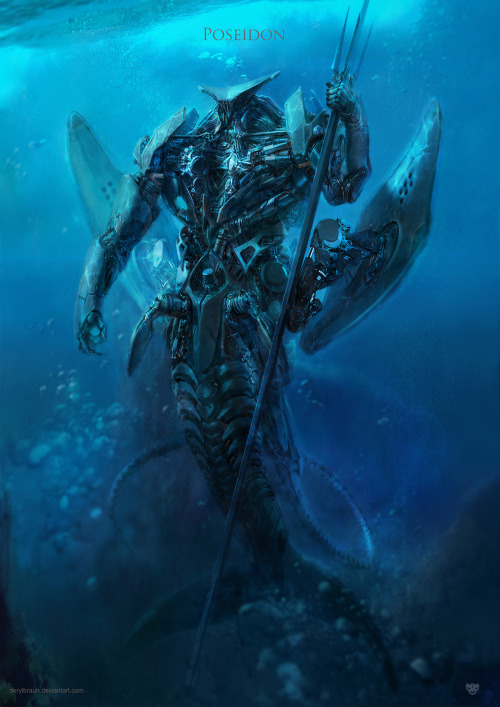
It was said that wherever Pegasus came down on land, a spring formed. Pegai in Greek were the springs that were the source of the river Oceanus. The name Pegasus was related to both the site of his birth and to the springs he was associated with. In his myths he was often connected to fresh water, specifically the cold springs that were found throughout the mountains of Greece. Pegasus was therefore connected to water through both of his parents as well as his equine form. When he looked down at the earth below him he lost his grip and fell to his death, his lack of faith preventing him from becoming a god. Other stories say that the hero became filled with doubt as he neared Olympus, believing it was not really the home of the gods. Injured in the fall, he lived the rest of his life disabled and alone. Like any horse, Pegasus bucked and reared when he was stung. According to one, Zeus was so angered by the mortal’s arrogance that he sent a gadfly to sting Pegasus on the back. There are several different stories about what happened to Bellerophon when he tried to ride Pegasus to Olympus. After many great victories, the hero became convinced that he had earned a place among the gods and he urged his horse to fly to Mount Olympus. Striking from far above, the hero was able to out maneuver and ambush any enemies he faced.Įventually, however, Pegasus would play a role in Bellerophon’s downfall. The flying horse aided Bellerophon in many later adventures as well. The speed of Pegasus had allowed Bellerophon to complete his impossible quest. Unable to breathe out its flames, the Chimera was burned from within and died. He urged Pegasus into a daring dive to ram his lead-tipped spear into the Chimer’s throat instead. The flying horse’s great speed and agility saved Bellerophon from being engulfed by the monster’s fiery breath.īellerophon shot arrows at the monster, but none could penetrate its skin. Pegasus flew his first rider to confront the Chimera. When the hero slipped Athena’s magical bridle onto the horse, it followed his instructions and allowed him to mount it. Bellerophon appealed to Athena and Poseidon, both gods associated with horses and equestrian inventions, to obtain a bridle that would tame Pegasus.įollowing Polyidus’s instructions, Bellerophon found Pegasus drinking at the Pirene spring outside of Corinth. The seer Polyidus to him that he could win, however, if he enlisted the aid of Pegasus. The fire-breathing monster was almost invulnerable, so the quest was meant to ensure Bellerophon’s death. Having been falsely accused of a crime, the Corinthian hero was tasked with slaying the Chimera. The most well known of the myths that feature Pegasus is that of Bellerophon. The immortal horse that was born of Medusa’s blood would become one of the most famous beasts in mythology. Pegasus, however, was much more famous than his brother.

He was the father of the giant Geryon, whose cattle Heracles stole, but he otherwise played no role in later stories. Her son Chrysaor would not play a major role in later myths. From the spilled blood, her two children were born.

When Medusa was struck by the hero’s sword, her blood spilled on the floor of the cavern in which she and her sisters had made their lair. He crept up on her as she slept, using the shining shield of Athena to look at her reflection instead of her petrifying face. The hero Perseus beheaded Medusa with help from Athena. While a later story claimed the Gorgon had once been a beautiful woman, earlier sources were unclear as to how or why Poseidon had mated with a monster. The flying horse’s parents were Poseidon and Medusa.

His origins, however, were with a hideous monster. Pegasus is usually considered a beautiful, noble creature. While Pegasus is seen among the clouds, he was actually rooted in water. The stories of Pegasus and his connections to Poseidon and Medusa make it clear that there was more to the horse than his ability to soar through the air. As unlikely as it may seem, the legendary horse was the offspring of a powerful god and a horrific monster. Bellerophon killed the Chimera, but the most well-known part of the story was that he did so on the back of Pegasus.ĭespite the animal’s enduring popularity, few people are as familiar with the story of its origins. The flying horse is arguably more famous today than the hero who tamed him. The beautiful winged horse was a favorite subject of Greek artists and continues to be an often-used form today. Pegasus is one of the most famous magical creatures in mythology.


 0 kommentar(er)
0 kommentar(er)
